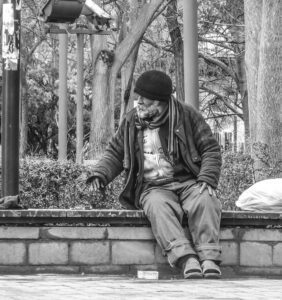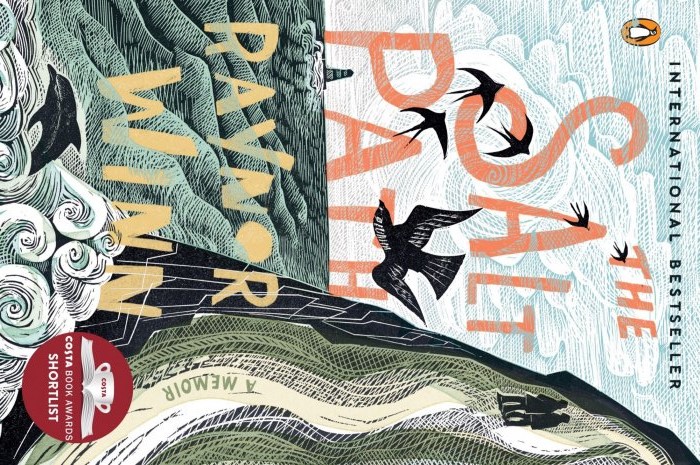07 May 2020
Homeless
Unwelcome and unsafe.
By Lynda Goetz
 I have just finished reading The Salt Path, the inspirational, lyrical, Costa-shortlisted book by Raynor Winn, published in 2018. It is the account of Ray and her husband Moth’s walk from Minehead in Somerset to Poole in Dorset, along the South West Coast Path, after they lost their home and livelihood and Moth was diagnosed with an incurable degenerative illness. It is hard even to read about such a traumatic start to a life-changing journey. The pain is palpable and yet at the same time the whole scenario almost unimaginable. “How” one cannot help asking, “would I cope with such a series of events?”
I have just finished reading The Salt Path, the inspirational, lyrical, Costa-shortlisted book by Raynor Winn, published in 2018. It is the account of Ray and her husband Moth’s walk from Minehead in Somerset to Poole in Dorset, along the South West Coast Path, after they lost their home and livelihood and Moth was diagnosed with an incurable degenerative illness. It is hard even to read about such a traumatic start to a life-changing journey. The pain is palpable and yet at the same time the whole scenario almost unimaginable. “How” one cannot help asking, “would I cope with such a series of events?”
The South West Coast Path, for those who have not walked any of its stunning but daunting miles, is hard enough for those who are reasonably fit and able to spend evenings in fully equipped campsites or pleasant B&Bs and know they have a home to return to at the end of their efforts. For two people in their 50s who have just lost everything, including their past and their future, and who are wild-camping out of necessity not whim, the one thing it did represent was freedom. Reluctant to rely on friends’ hospitality (which they knew could quickly be exhausted), unable to pay for a private rental and unwilling to put themselves at the mercy of council housing policy, they were buying time to accept the terrible enormity of their situation. The terrifying rapidity with which these events had come to a head appeared to have given them no time to concoct a Plan A, let alone a Plan B; so Plan C it was. Walk out of the door with two relatively light backpacks; leave the old car with friends and set off for Minehead and the start of the trail.
As they quickly found out, admiration for the ‘elderly ‘ couple’s adventure soon turned to distaste if they admitted that the reason they had so much time to go wandering was not that they had ‘sold up and opted out’ temporarily, but that they were actually homeless. In a short chapter early in the book the author gives some statistics and information on homelessness in the UK. Rather like Covid-19 statistics, they cannot, as she points out, be relied upon. What is abundantly clear, however, is that not all ‘rough-sleepers’ are alcoholics or drug addicts. Obviously we know this really, but as Ray and Moth discovered all too rapidly, those who were fortunate enough to have ‘homes to go to’ were immediately mistrustful of those who didn’t. The fact that they were unable to comply with modern hygiene regimes was almost certainly part of the problem, but what is it that makes most of us so wary of those who are in the unfortunate position of having nowhere to call home?
On 26th March, three days after lockdown, the Housing Minister, Luke Hall, wrote to local authorities advising them of the measures they should be taking to protect rough sleepers during the coronavirus outbreak, in particular getting them into ‘appropriate accommodation by the end of the week’. An article in The Lancet published on 26th March also outlined the measures that the medical world was taking in conjunction with Government to either care for those who were homeless with symptoms or protect those who were as yet unaffected. These plans all included cooperation from the private sector, in particular from hotels unable to take in commercial guests at this time because of the Covid-19 regulations. The measures taken appear to have been largely successful, with numbers of homeless taken off the streets and into accommodation. What, though, will happen when crisis measures are wound down, hotels need their rooms back and government largesse is no longer thrown at local authorities to help them tackle the situation? Will the homeless in any event be prepared to continue to accept accommodation in return for an inevitable curtailment of freedom? What is acceptable under lockdown may not be so once it is over.

People become homeless for many reasons and as those who have worked or volunteered in food banks, homeless shelters or soup kitchens know, their back stories are often fascinating. Is the way so many of us shun them caused by more than the simple fact that they cannot shower every day or is it also possibly an unacknowledged fear of contagion? Anyone who has been divorced will almost certainly be aware of the feeling that others, sometimes even unwittingly, keep them at arm’s length. Is it that now you are on your own you may try to poach their own partner or is it more that the cracks in their relationships might be widened by the contact? In the same way, homelessness can perhaps make many aware of the narrow gap between the sunny uplands of a world with a job, a home and family and the dark chasm of a world where all these things have disappeared.
So, what next for all us post Covid, but in particular, what next for the homeless? It was announced earlier this week that the former homelessness tsar, Dame Louise Casey, would be spearheading government efforts to house rough sleepers. A new taskforce under Dame Louise’s direction will work with local councils to attempt to ensure that ‘as few people as possible return to life on the streets’. Currently, it appears, more than 90% of those known by councils to be sleeping rough have been housed under the measures taken following the initiatives proposed by Luke Hall MP in that letter at the end of March (being a statistic, that does not of course mean 90% of those who are actually rough sleeping). Casey returned to Whitehall in February to lead an urgent review into the causes of rough sleeping which, with her earlier work experiences, makes her well placed to deal with the current task.
The Big Issue gave this initiative by Boris’s government a cautious welcome in its online 4th May edition, but warned that a ‘one size fits all’ cannot work. Although the initial aim is to ensure that rough-sleepers can move into long-term safe accommodation once lockdown is over, perhaps it may also prove possible longer term for the taskforce to help more to take life back into their own control as Ray and Moth did (in their case without outside help)? Crisis executive Jon Sparkes also welcomed the move and cited the example of the ‘wraparound’ Housing First success in Scotland. Not all those who are homeless will be able to adapt easily to safe long-term accommodation and the associated rules and regulations. For some this proved impossible even during lockdown*.
Others, like the group encountered by the Winns during their time on the path, preferred to keep to the woods, where it seemed they led an almost Robin Hood style existence; going out each day not to rob the rich but simply to work. Not everyone who is homeless, it appears, would trade their freedom for city-centre safety. Like the rest of us, the homeless are individuals. It will be interesting to see if the post-coronavirus world holds any real changes for us and them – or should I simply say for all of us?
*In Milton Keynes, the behaviour of some of the homeless spoilt an opportunity for a four-star hotel stay for others.


